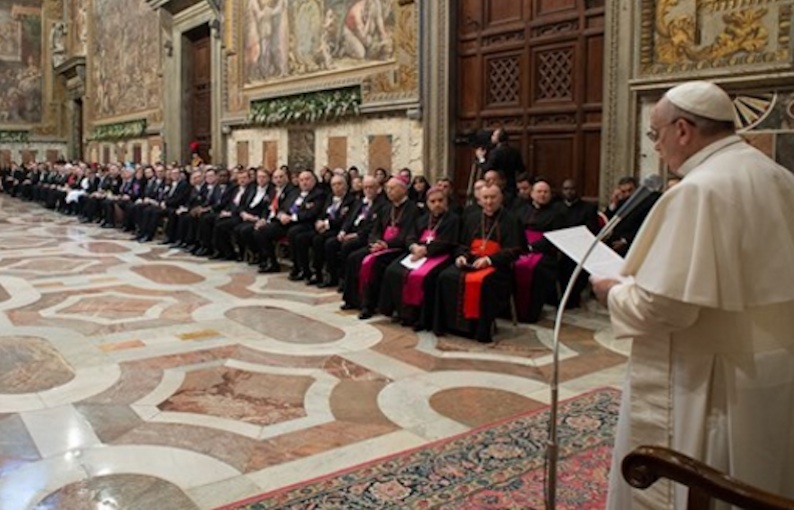Francis, during his appointment yesterday with ambassadors in the Vatican.
Darío Menor. Vatican City
The diplomatic world has a date in the Sala Regia in the Apostolic Palace in Vatican City at the beginning of every January, an audience with the Pope which he gives to the ambassadors to the Holy See in order to wish them a happy new year. Yesterday, the Pontiff focused his address on the immigration drama.
Speaking to the representatives of the more than 180 countries maintaining diplomatic relations with the Holy See, Pope Francis referred to the migratory problem and invited them to “ascertain its causes, implement solutions and overcome the inevitable fear that accompanies such a consistent and extraordinary phenomenon”.
The challenge that Europe must face is a gargantuan one, as the flow of immigrants and refugees throughout 2015 “has no precedents in recent history, not even at the end of the Second World War”. In spite of this, the Old Continent has “the necessary instruments to defend the centrality of the human being and to find a fair balance in the moral duty of fostering the rights of its citizens on the one hand, and on the other the assistance and welcome of emigrants”.
In order to succeed in this enormous task, the Pope asked Europe to be inspired by its “great cultural and religious inheritance”.
[hr style=”single”]
Pontiff praises agreement between FARC and the Colombian Government
[hr style=”single”]
In his denunciation of the insecurity felt by those during their flight by those fleeing “extreme misery, atrocious wars, persecutions and violations of human rights or political and social instability”, the Pope lamented that “often” many of these emigrants remain outside “international protection systems by virtue of international agreements”. He considered that this situation is one more example of the “throwaway culture” he has criticised so many times.
Francis left an opening in his address for optimism. He praised the signing of “important international agreements” in 2015, pointing to the Iranian nuclear pact or the so-called COP21, the climate change conference held in Paris. “These augur well for the future,” he said.
He also praised “the efforts of the Colombian nation to overcome the conflicts of the past and to achieve that longed for peace”. On the other hand he lamented the escalation of tension between Saudi Arabia and Iran and “the worrying military test that was held on the Korean Peninsula”.





